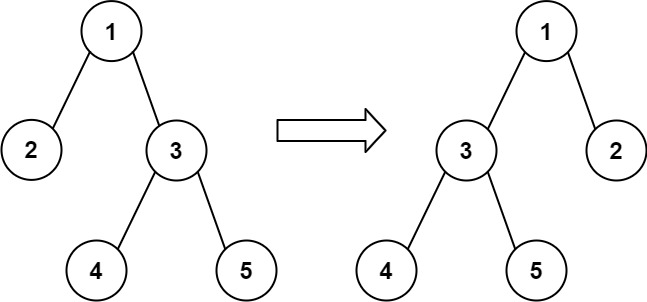tree dfs bfs Leetcode 0971. Flip Binary Tree To Match Preorder Traversal
https://leetcode.com/problems/flip-binary-tree-to-match-preorder-traversal
Problem statement:
You are given the root of a binary tree with n nodes, where each node is uniquely assigned a value from 1 to n. You are also given a sequence of n values voyage, which is the desired pre-order traversal of the binary tree.
Any node in the binary tree can be flipped by swapping its left and right subtrees. For example, flipping node 1 will have the following effect:

Flip the smallest number of nodes so that the pre-order traversal of the tree matches voyage.
Return a list of the values of all flipped nodes. You may return the answer in any order. If it is impossible to flip the nodes in the tree to make the pre-order traversal match voyage, return the list [-1].
Solution:
For me it was not medium problem, more like hard. First of all it is asked in problem statement to find the minimum number of flips, however in fact we do not have choice: I think everything is determenistic here. The first thing you need to think about when you see tree, it is dfs or bfs. Let us choose recursive dfs, it is usally easier to code and understand.
self.ansis our list with flipped nodes.self.indis where exaclty at ourvoyagearray we are now. This is tricky part! If you do not use something similar, you still can solve problem, but it will be more likeO(n^2)complexity.
dfs(node) function will work recursively as usual.
- Check if we go outside our tree or we out of elements in
voyage, in this case we just go back. - Also, we expect, that value of current node we are in now is equal to element we are currently in
voyage: if it is not the case, no flipping can save this situation. So, if we see that this condition does not hold, we addNoneto the answer and return. In the end we going to check if we haveNonein answer or not. - Define
dr = 1: direction of traversal (meansleft -> rightand-1meansright -> left), also increaseself.indby one. - Check if we need to do flip: we need if
node.left.valis not equal tovoyage[self.ind]: in this case what is expected to be next node in traversal is not equal to the next node in voyages. We add node to answer and change direction. Note, that in the opposite case we can not flip this node, that is everything is determenistic. - Traverse children in right direction and run
dfs(child). - In the end, run
dfs(root)and check if we haveNoneinside, if we have it means that at one moment of time we have impossible option and we need to return[-1]. In opposite case we returnself.ans.
Complexity:
What we did here is just traversed our tree, using dfs, so time complexity is O(n), where n is number of nodes in tree. Space complexity is potentially O(n) as well.
Code
class Solution:
def flipMatchVoyage(self, root, voyage):
self.ans, self.ind = [], 0
def dfs(node):
if not node or self.ind == len(voyage): return
if node.val != voyage[self.ind]:
self.ans.append(None)
return
dr, self.ind = 1, self.ind + 1
if node.left and node.left.val != voyage[self.ind]:
self.ans.append(node.val)
dr = -1
for child in [node.left, node.right][::dr]:
dfs(child)
dfs(root)
return [-1] if None in self.ans else self.ans
If you have any questions, feel free to ask. If you like solution and explanations, please Upvote!
If you like the solution, you can upvote it on leetcode discussion section: Problem 0971